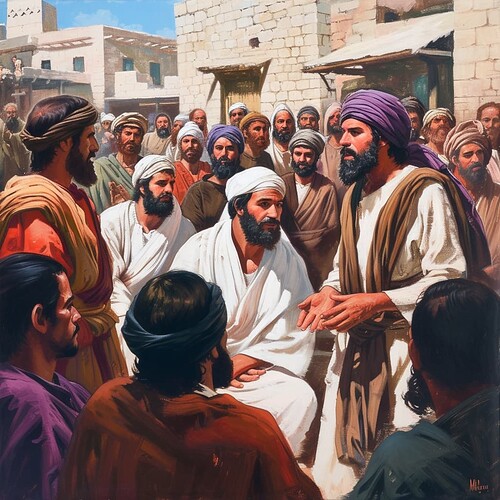 February 11: Mark 7 - Tradition vs Transformation
February 11: Mark 7 - Tradition vs Transformation
 Introduction
Introduction
As we delve into the seventh chapter of Mark, we’re met with the continuous display of Jesus challenging traditional mindsets and norms. He criticizes the practices that have lost their spiritual significance and become mere rituals, leading us to a fundamental question - should our traditions define us, or should we redefine our traditions?
 Defiling Comes from Within
Defiling Comes from Within
Jesus chastises the Pharisees for focusing on external purification rites, neglecting the impurities that stem from the heart.
![]() Key Verse: Mark 7:15 - “Nothing outside a person can defile them by going into them. Rather, it’s what comes out of a person that defiles them.”
Key Verse: Mark 7:15 - “Nothing outside a person can defile them by going into them. Rather, it’s what comes out of a person that defiles them.”
 Healing the Syrophoenician Woman’s Daughter
Healing the Syrophoenician Woman’s Daughter
Demonstrating profound sensitivity, Jesus acknowledges the faith of a Gentile woman and grants her request for her daughter’s healing.
 Key Themes and Reflections
Key Themes and Reflections
Faith Over Traditions: Christ compels us to scrutinize our rituals and traditions. Are they coming from a place of genuine faith in God, or are they mere habitual processes?
Divine Compassion Knows No Boundaries: The healing of the Syrophoenician woman’s daughter demonstrates Jesus’ compassion, with no class, gender, or race distinctions.
 Today’s Application
Today’s Application
Let’s reflect upon our actions and habits. Do they express a crypto-Christian culture or an authentic relationship with Christ? Do our hearts echo with the praises of God, or merely our lips?
 Hidden Gem
Hidden Gem
Notice the Syrophoenician woman’s humility and persistence. Her response denotes a divine insight - crumbs from God’s table have ample nourishment to heal and satisfy.
 Reflective Q&A
Reflective Q&A
![]() How are traditions impacting our relationship with God today?
How are traditions impacting our relationship with God today?
A: They can either strengthen our bond by providing a framework for expressing faith or distract us by turning into an obligation.
![]() What can we learn from the Syrophoenician woman’s interaction with Jesus?
What can we learn from the Syrophoenician woman’s interaction with Jesus?
A: We learn about persistent faith, humility, and the understanding that God’s blessings are abundant, even a ‘crumb’ can bring transformation.
![]() How can we ensure our internal purity?
How can we ensure our internal purity?
A: By practicing mindfulness of our thoughts, words, actions, and their alignment with God’s teachings.
 Join the Discussion
Join the Discussion
Share your reflections on balancing traditions and spiritual authenticity. How do you maintain purity of the heart amidst everyday distractions?
 See You Tomorrow in Mark 8
See You Tomorrow in Mark 8
We’ll be exploring Jesus’ miraculous feeding of the four thousand, and His prophetic utterances about suffering and denial. Let’s continue our journey, remembering to cleanse our hearts and not just our hands, to transform traditions into personalized expressions of faith. See you then!
